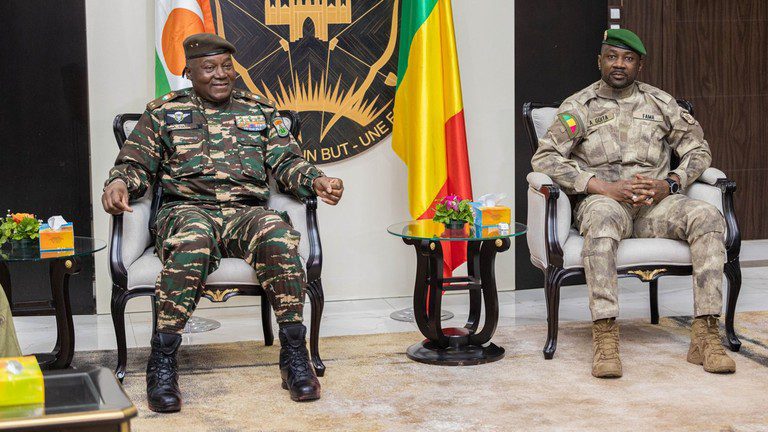Africa
Niger’s coup leader embarks on his inaugural foreign tour

General Abdourahamane Tchiani, the military leader of Niger, has been outside for the first time since seizing power in a coup. The head of state visited the military-run neighbouring countries of Mali and Burkina Faso on Thursday.
After President Mohammed Bazoum was overthrown, General Tchiani was welcomed with open arms in both Bamako and Ouagadougou. He congratulated his counterparts for standing with Niger in the face of sanctions and threats from both domestic and international sources.
In reaction to the military coup on July 26, the West African regional organisation ECOWAS imposed sanctions on Niger, including border closures and a trade embargo. Additionally, Niamey’s accounts at regional central banks have been frozen by the 15-state union.
Abdourahamane stated that Niger was able to “resist the threats of ECOWAS, and to face the embargo” imposed by the organisation thanks to the assistance of the authorities in Mali and Burkina Faso.
“It seems like the embargo was implemented to put pressure on the government, but we are aware that people are the ones who suffer, and this ignores that truth. According to the AFP news agency, he stated, “That’s why we are willing to exchange, to negotiate, but with people who are motivated by good intentions, with sincere people, with people who care about the African people.”
Mali and Burkina Faso have both pledged support for the coup leadership in Niger and cautioned against military incursions, which the ECOWAS has vowed to employ in an attempt to reinstate Bazoum’s 2021-starting government.
All three of the former French colonies signed a charter in September promising to support one another individually or jointly in the event of external aggression or internal threats to their sovereignty. The three nations, together with Chad and Mauritania, had previously been participants of the G5 Sahel agreement, which was endorsed by Paris. The deal established the Alliance of Sahel States (AES) of these nations. Since then, the G5 agreement has fallen apart as a result of multiple military takeovers in the area.
In a statement published on social media site X, Assimi Goita, the acting president of Mali, stated that the main topics of discussion during their meeting with General Tchiani on Thursday were “mutual aid between sister countries of the Sahel and the complete operationalization of AES.”
Burkina Faso’s presidency said in a statement that later that day, Ibrahim Traore, the leader of Nigerien and military ruler, spoke about “issues common to the two countries, particularly the fight against terrorism and socio-economic development issues” in Ouagadougou.
The AES’s establishment, according to General Tchiani, will turn the Sahel from a “zone of insecurity” to a “zone of prosperity.”
France was briefly involved in fighting the Islamic insurgency that has engulfed the Sahel countries over the past ten years. However, the military regimes in Bamako, Ouagadougou, and Niamey have strained relations with Paris due to recent coups in the region, causing the former colonial power to remove its soldiers from all three governments.
